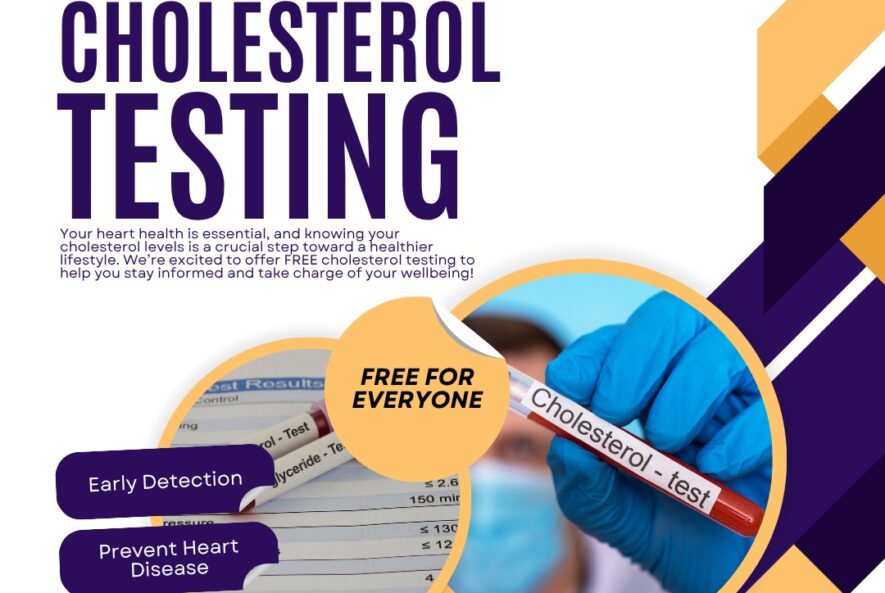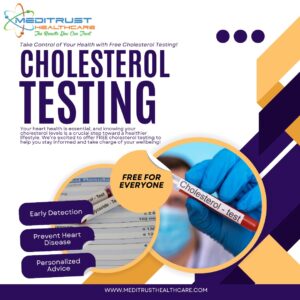
What is Cholesterol Test – Procedure, Importance, and Report
Cholesterol is a waxy, fat-like substance present in every cell of the body. While it is essential for producing hormones, vitamin D, and substances that help digest foods, high levels of cholesterol can lead to serious health issues, including heart disease and stroke. This makes monitoring cholesterol levels a crucial part of maintaining overall health.
A cholesterol test, also known as a lipid profile, measures the levels of different types of cholesterol and fats in your blood, helping doctors assess your risk of cardiovascular problems.
Why is a Cholesterol Test Important?
A cholesterol test is essential for the following reasons:
-
Early Detection of Heart Disease Risk: High cholesterol often does not show symptoms. A cholesterol test can help detect potential risks early.
-
Monitoring Treatment: For individuals on cholesterol-lowering medications or lifestyle changes, the test helps track progress.
-
Preventive Health: Regular cholesterol checks are vital for adults above 20, especially those with a family history of heart disease or other risk factors.
Types of Cholesterol Measured
A standard cholesterol test usually measures:
-
Total Cholesterol: The overall amount of cholesterol in your blood.
-
Low-Density Lipoprotein (LDL): Known as “bad cholesterol,” high levels can lead to plaque buildup in arteries.
-
High-Density Lipoprotein (HDL): Known as “good cholesterol,” it helps remove LDL cholesterol from the bloodstream.
-
Triglycerides: A type of fat in the blood; high levels increase heart disease risk.
Procedure of a Cholesterol Test
The procedure is simple and quick:
-
Fasting (Optional): You may be asked to fast for 9-12 hours before the test. Water is allowed.
-
Blood Sample Collection: A healthcare professional draws a small sample of blood from your arm using a needle.
-
Laboratory Analysis: The blood sample is analyzed in a lab to measure cholesterol and triglyceride levels.
-
Results Interpretation: Results are usually available within a day or two, depending on the lab.
Understanding Your Cholesterol Report
Cholesterol reports typically display values in milligrams per deciliter (mg/dL). Here’s a general guideline:
| Type | Desirable | Borderline | High Risk |
|---|---|---|---|
| Total Cholesterol | < 200 mg/dL | 200–239 mg/dL | ≥ 240 mg/dL |
| LDL (Bad) | < 100 mg/dL | 100–159 mg/dL | ≥ 160 mg/dL |
| HDL (Good) | ≥ 60 mg/dL | 40–59 mg/dL | < 40 mg/dL |
| Triglycerides | < 150 mg/dL | 150–199 mg/dL | ≥ 200 mg/dL |
Your doctor may interpret these results based on your age, medical history, and other risk factors, recommending lifestyle changes or medication if necessary.
Tips to Maintain Healthy Cholesterol Levels
-
Eat a Heart-Healthy Diet: Focus on fruits, vegetables, whole grains, and lean proteins.
-
Exercise Regularly: Aim for at least 30 minutes of moderate activity most days.
-
Avoid Smoking and Limit Alcohol: Both can negatively impact cholesterol levels.
-
Maintain a Healthy Weight: Obesity increases the risk of high cholesterol.
Conclusion
A cholesterol test is a simple yet vital tool to monitor heart health. Regular testing, coupled with a healthy lifestyle, can significantly reduce the risk of heart disease and stroke. At MediTrust Healthcare, we provide accurate cholesterol testing and detailed reports to help you stay on top of your health.












